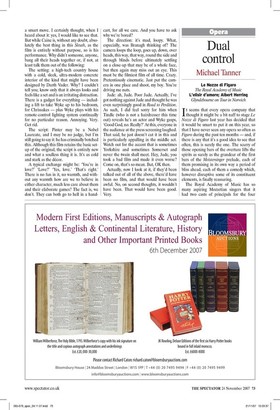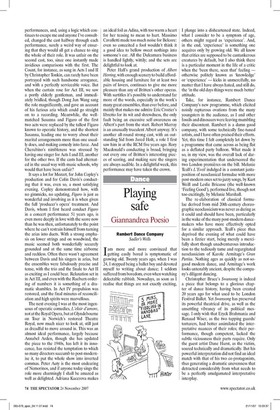Dual control
Michael Tanner Le Nozze di Figaro The Royal Academy of Music L'elisir d'amore; Albert Herring Glyndeboume on Tour in Norwich It seems that every opera company that thought it might be a bit naff to stage Le Nozze di Figaro last year has decided that it would be smart to put it on this year, so that I have never seen any opera so often as Figaro during the past ten months — and, if there is any that it's a good idea to see that often, this is surely the one. The scurry of those opening bars of the overture lifts the spirits as surely as the grandeur of the first bars of the Meistersinger prelude, each of them promising in its own way a period of bliss ahead, each of them a comedy which, however disruptive some of its constituent elements, is finally reassuring.
The Royal Academy of Music has so many aspiring Mozartian singers that it had two casts of principals for the four performances, and, using a logic which continues to escape me and anyone I've consulted, changed the cast halfway through each performance, surely a weird way of ensuring that they would all get a chance to sing the whole of their role. It was unfair on the second cast, too, since one instantly made invidious comparisons with the first. The Count, for instance, as sung in Acts I and II by Christopher Tonkin, can rarely have been portrayed with such handsome arrogance, and with a perfectly serviceable voice. But when the curtain rose for Act III, we saw a portly elderly gentleman, and immediately bridled, though Dong Jun Wang sang the role magnificently, and gave an account of his furious aria which could go straight on to a recording. Meanwhile, the wellmatched Susanna and Figaro of the first two acts were replaced by the tallest Figaro known to operatic history, and the shortest Susanna, leading one to worry about their marital arrangements more than one usually does, and making comedy into farce. And Cherubino's nimbleness was stressed by having one singer for Acts I and III, another for the other two. If the casts had alternated in the usual way with music schools, why would that have been unfair?
It says a lot for Mozart, for John Copley's production and for Cohn Davis's conducting that it was, even so, a most satisfying evening. Copley demonstrated how, with no gimmicks, no updating, Figaro is just as wonderful and involving as it is when given the full 'producer's opera' treatment. And Davis, whom I first heard conduct Figaro in a concert performance 51 years ago, is even more deeply in love with the score now than he was then, unfortunately to the point where he can't restrain himself from turning the arias into duets. With a strong emphasis on lower strings and on woodwind, the music seemed both wonderfully securely grounded and at the same time airborne and reckless. Often there wasn't agreement between Davis and his singers in arias, but the ensembles were fabulously precise and tense, with the trio and the finale to Act II as exciting as I could bear. Relaxation set in in Act III, and even with the Raeburn ordering of numbers it is something of a dramatic shambles. In Act IV propulsion was restored, and the final minutes of reconciliation and high spirits were marvellous.
The next evening I was at the most ingenuous of operatic comedies, L'elisir d'amore, not at the Royal Opera, but at Glyndebourne on Tour in Norwich's restored Theatre Royal, now much nicer to look at, still just as dreadful to move around in. This was an almost ideal performance, largely because Annabel Arden, though she has updated the piece to the 1940s, has left it its innocence, has resisted the temptation to which so many directors succumb to post-modernise it, to put the whole show into inverted commas. Peter Auty is the most endearing of Nemorinos, and if anyone today sings the role more charmingly I shall be amazed as well as delighted. Adriana Kucerova makes an ideal foil as Adina, with too warm a heart for her teasing to mean to hurt. Massimo Cavalletti made too much noise for Belcore: even so conceited a fool wouldn't think it a good idea to bellow sweet nothings into someone's ear. All the Dulcamara business is handled lightly, wittily; and the sets are delightful to look at.
Peter Hall's grand production of Albert Herring, with enough scenery to build affordable housing and furniture for at least two pairs of lovers, continues to give me more pleasure than any of Britten's other operas. With surtitles it's possible to understand far more of the words, especially in the work's many great ensembles, than ever before, and mainly that makes me admire Eric Crozier's libretto for its wit and shrewdness, the only fault being an excessive self-awareness on Albert's part from the start. Robert Murray is an unusually truculent Albert anyway. It's another all-round strong cast, with an outstanding Sid from Jared Holt, a role I first saw him in at the RCM five years ago. Rory Macdonald's conducting is broad, bringing out every one of Britten's interesting pieces of scoring, and making sure the singers are always audible. In a delightful week, this performance may have taken the crown.







































































 Previous page
Previous page